| 1
|
Rajendra Prasad
(1884–1963)
|
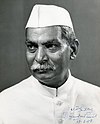
|
1952
1957
|
26 January 1950
|
12 May 1962
|
120
|
Sarvepalli Radhakrishnan
|
|
Indian National Congress
|
Prasad, from Bihar, was the first President of independent
India and also the longest-serving President, as the only president to
serve two terms in office. He was also a freedom fighter during the Indian independence movement.
|
| 2
|
Sarvepalli Radhakrishnan
(1888–1975)
|

|
1962
|
13 May 1962
|
13 May 1967
|
60
|
Zakir Husain
|
|
Independent
|
Radhakrishnan was a prominent philosopher and writer and
also held the position of vice-chancellor of the Andhra University and
Banaras Hindu University. He received the Bharat Ratna award in 1954
before becoming the President. He was the first President from South
India.
|
| 3
|
Zakir Husain
(1897–1969)
|
|
1967
|
13 May 1967
|
3 May 1969
|
24
|
Varahagiri Venkata Giri
|
|
Independent
|
Husain was vice-chancellor of the Aligarh
Muslim University and a recipient of Padma Vibhushan and Bharat Ratna.
He died in office, the first to do so. He was also the shortest-serving
President. He was also the first Muslim President.
|
| –
|
Varahagiri Venkata Giri*
(1894–1980)
|
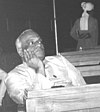
|
–
|
3 May 1969
|
20 July 1969
|
3
|
–
|
|
–
|
He was elected Vice President of India in 1967. Following the
death of President Zakir Husain, Giri was appointed as Acting
President. He resigned after a few months to take part in the presidential elections.
|
| –
|
Mohammad Hidayatullah*
(1905–1992)
|

|
–
|
20 July 1969
|
24 August 1969
|
1
|
–
|
|
–
|
Hidayatullah served as the Chief Justice of India and was
also a recipient of the Order of the British Empire.He served as Acting
President until the election of Giri as the President of India.
|
| 4
|
Varahagiri Venkata Giri
(1894–1980)
|

|
1969
|
24 August 1969
|
24 August 1974
|
60
|
Gopal Swarup Pathak
|
|
Independent
|
Giri was the first person to have served as both an acting
president and president of India. He was a recipient of the Bharat
Ratna, and served as Indian Minister of Labour and High Commissioner to
Ceylon (Sri Lanka).
|
| 5
|
Fakhruddin Ali Ahmed
(1905–1977)
|

|
1974
|
24 August 1974
|
11 February 1977
|
36
|
Gopal Swarup Pathak (1974)
Basappa Danappa Jatti (1974–1977)
|
|
Indian National Congress
|
Ahmed served as a Minister before being elected as president.
He died in 1977 before his term of office ended, and was the second
Indian president to die in office. He was also president during Emergency.
|
| –
|
Basappa Danappa Jatti*
(1912–2002)
|
|
–
|
11 February 1977
|
25 July 1977
|
6
|
–
|
|
–
|
Jatti was the vice president of India during Ahmed's term of
office, and was sworn in as Acting President upon Ahmed's death. He
earlier served as the Chief Minister for the State of Mysore State.
|
| 6
|
Neelam Sanjiva Reddy
(1913–1996)
|

|
1977
|
25 July 1977
|
25 July 1982
|
60
|
Basappa Danappa Jatti (1977–1979)
Mohammad Hidayatullah (1979–1982)
|
|
Janata Party
|
Reddy was the first Chief Minister of Andhra Pradesh.
Reddy was the only Member of Parliament from the Janata Party to get
elected from Andhra Pradesh. He was unanimously elected Speaker of the
Lok Sabha on 26 March 1977 and relinquished this office on 13 July 1977
to become the 6th President of India.
|
| 7
|
Zail Singh
(1916–1994)
|

|
1982
|
25 July 1982
|
25 July 1987
|
60
|
Mohammad Hidayatullah (1982–1984)
Ramaswamy Venkataraman (1984–1987)
|
|
Indian National Congress
|
In March 1972, Singh assumed the position of Chief
Minister of Punjab, and in 1980, he became Union Home Minister. He was
also secretary general to Non-Aligned Movement (NAM) from 1983 to 1986
|
| 8
|
Ramaswamy Venkataraman
(1910–2009)
|
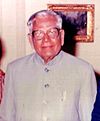
|
1987
|
25 July 1987
|
25 July 1992
|
60
|
Shankar Dayal Sharma
|
|
Indian National Congress
|
In 1942, Venkataraman was jailed by the British for his involvement in the Indian independence movement.
After his release, he was elected to independent India’s Provisional
Parliament as a member of the Congress Party in 1950 and eventually
joined the central government, where he first served as Minister of
Finance and Industry and later as Minister of Defence.
|
| 9
|
Shankar Dayal Sharma
(1918–1999)
|
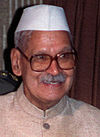
|
1992
|
25 July 1992
|
25 July 1997
|
60
|
Kocheril Raman Narayanan
|
|
Indian National Congress
|
Sharma was Chief Minister of Madhya Pradesh, and the
Indian Minister for Communications. He also served as the Governor of
Andhra Pradesh, Punjab and Maharashtra.
|
| 10
|
Kocheril Raman Narayanan
(1920–2005)
|

|
1997
|
25 July 1997
|
25 July 2002
|
60
|
Krishan Kant
|
|
Independent
|
Narayanan served as India's ambassador to Thailand,
Turkey,
China and United States of America. He received doctorates in Science
and Law and was also a chancellor in several universities. He was also
the vice-chancellor of Jawaharlal Nehru University. He was the first
Dalit President.
|
| 11
|
Avul Pakir Jainulabdeen Abdul Kalam
(1931–2015)
|

|
2002
|
25 July 2002
|
25 July 2007
|
60
|
Krishan Kant (2002)
Bhairon Singh Shekhawat (2002–2007)
|
|
Independent
|
Kalam was an educator and engineer who played a leading role
in the development of India's ballistic missile and nuclear weapons
programs. He also received the Bharat Ratna. Kalam died following a heart attack while delivering a speech in Shillong.
|
| 12
|
Pratibha Patil
(1934–)
|

|
2007
|
25 July 2007
|
25 July 2012
|
60
|
Mohammad Hamid Ansari
|
|
Indian National Congress
|
Patil was the first woman to become the President of India. She was also the first female governor of Rajasthan.
|
| 13
|
Pranab Mukherjee
(1935–)
|

|
2012
|
25 July 2012
|
25 July 2017
|
60
|
Mohammad Hamid Ansari
|
|
Indian National Congress
|
Mukherjee held various posts in the cabinet ministry for
the Government of India such as Finance Minister, Foreign Minister,
Defence Minister and Deputy Chairman of the Planning Commission.
|
| 14
|
Ram Nath Kovind
(1945–)
|
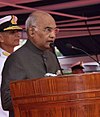
|
2017
|
25 July 2017
|
Incumbent
|
–
|
Venkaiah Naidu
|
|
Bharatiya Janata Party
|
Kovind was governor of Bihar from 2015 to 2017 and a
Member of Parliament from 1994 to 2006. He is the second Dalit president
(after K. R. Narayanan) and is the first President from the Bharatiya
Janata Party (BJP) and is an active member of Rashtriya Swayamsevak
Sangh (RSS) since his youth. |
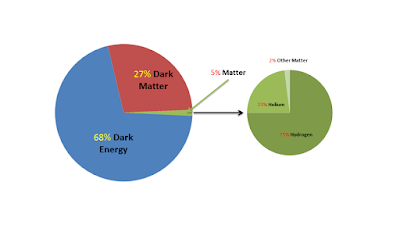
No comments:
Post a Comment